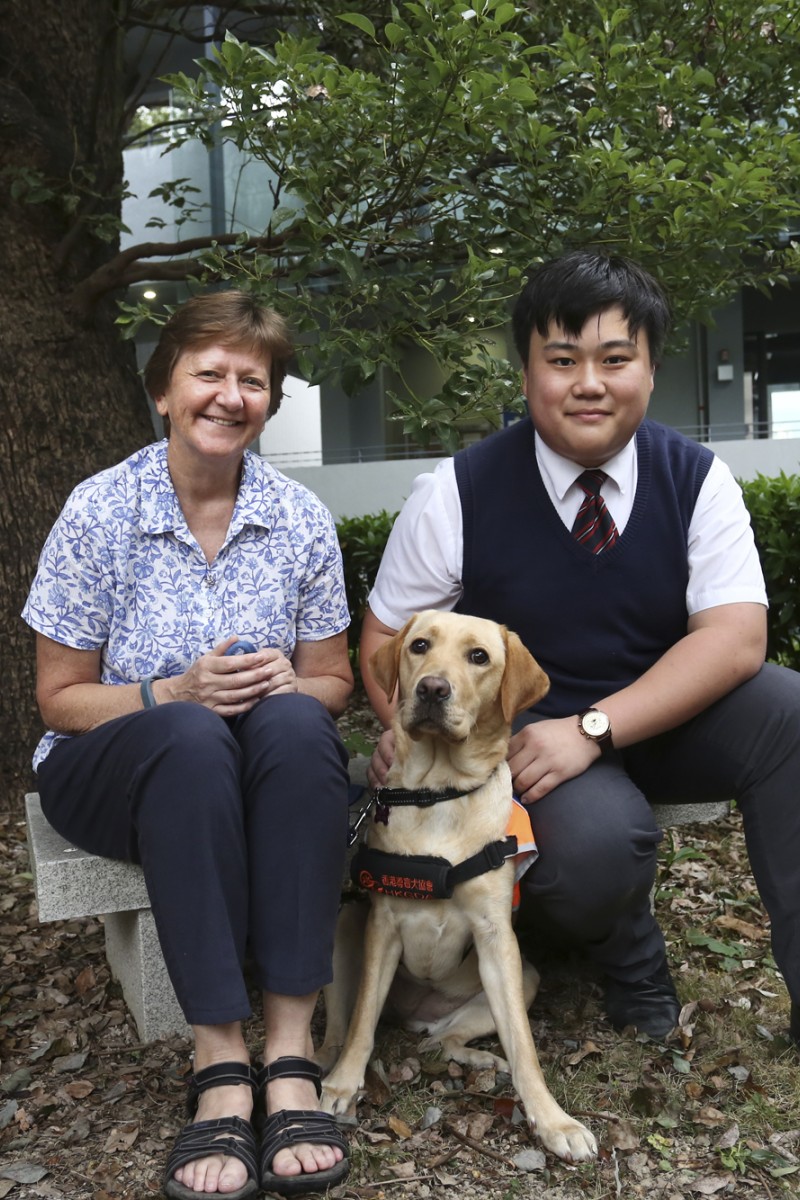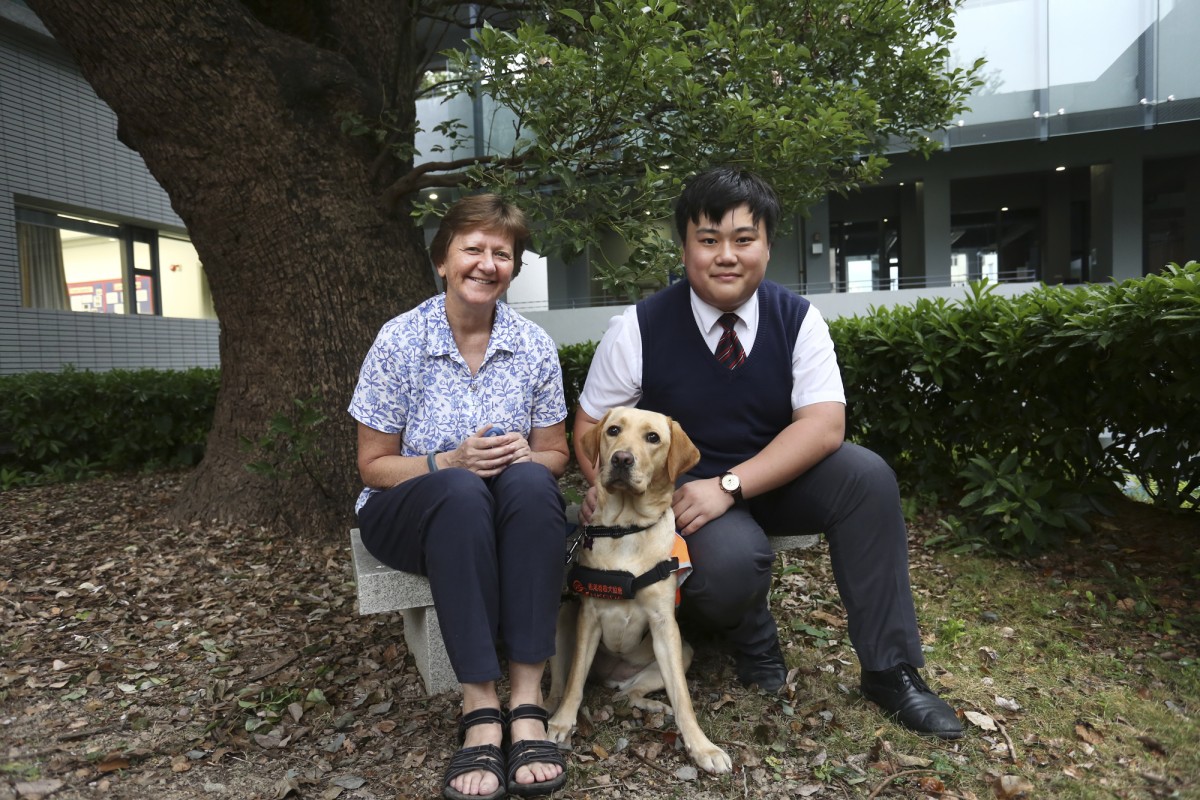
Diocesan Boys' School favourite student sleeps through most of school
DBS is the first secondary school in Hong Kong to raise a guide dog puppy, and the students couldn't be happier
 Gaby McDonald (left) with Delta, and 17-year-old student Stanley Lee Sze-hang.
Gaby McDonald (left) with Delta, and 17-year-old student Stanley Lee Sze-hang.Delta regularly attends biology class at Diocesan Boys' School, but most of the time she just sleeps through them.
"She finds my lessons utterly boring," chuckles Gaby McDonald, looking fondly at the guide dog puppy lying in her doggie bed beside the teacher's desk.
Delta is a 16-month-old Labrador with a perpetually wagging tail who is under the foster care of McDonald until February next year, when she will enter the Guide Dog Training Programme with the Hong Kong Guide Dogs Association (HKGDA). She is the first guide dog puppy to be raised in a local secondary school, and has been living with McDonald, a biology teacher at DBS, for more than a year.
Every day, Delta and McDonald wake up at 5am. McDonald takes the puppy out to the toilet, then prepares breakfast for Delta and her cat Rhoghan. Delta is allowed to play for a while before going to sleep again. At 8am, McDonald walks Delta from their home on campus to the biology lab. If there is an assembly that day, McDonald straps an orange vest onto Delta and puts on her blue working lead.
"When she has her vest on, she knows that she is working and won't go doing things like chewing vegetation," says McDonald. "Sometimes, she even walks herself, with her own lead in her mouth."
Delta goes everywhere McDonald does - whether it be class, school events, or weekend hikes. Being under McDonald's care for a year is a socialisation process that is important to get Delta used to different types of people, places and forms of public transport, says Fish Chan Wing-chee, Puppy Raising Supervisor at the HKGDA. She says guide dogs which were raised with foster parents who worked were usually more patient and performed better.
While they are still allowed to have fun, guide dog puppies need to be raised differently from pet dogs. They are not allowed to have human food or root through garbage, which encourages stealing. They are also not taught tricks like chasing balls because they may easily become distracted when they work. They need to learn to walk in the front, and always on one side.
"You're also not supposed to pet them too much," explains Stanley Lee Sze-hang, a Grade 12 boarding student who sometimes walks Delta. "I was quite nervous when I took her out alone for the first time, wondering if I should do this or that. I guess that's what happens when you take care of others - there's lots of things you need to be aware of. It helped me realise how important the details are."
Malcolm Chan Man-hang, Stanley's biology classmate, gets to class early to play with Delta, even though biology isn't his favourite subject. "Delta adds a little excitement to class, and we can play with her during breaks," says Malcolm.
Although the DBS headmaster immediately agreed to let McDonald have Delta at school, and even offered their campus for the HKGDA's monthly guide dog puppy training sessions, McDonald was worried that having Delta in class would be hugely disruptive. For the first week, she kept Delta in a cage. But Delta was calm, and McDonald soon let her sleep on a bed beside her desk, tying her up when the students had to do dissections. One time, McDonald forgot, but Delta stayed where she was. "She just trains herself," says McDonald. "I think I've only heard her bark four times. She's the best dog I've ever had."
Delta is an eighth generation Labrador bred especially to be a guide dog, and was chosen after a series of tests proved she was calm, brave and willing to take initiative.
Steven Lai Lap-hin, Service Coordinator at the Chinese Evangelical Zion Church Social Service Division, says it would be a good thing if more schools had dogs. Lai has been using animals to help socially withdrawn people in Hong Kong for more than five years.
"They don't need to be defensive in front of an animal, because they know they won't be judged by their looks or clothing. So they find it easier to open up and be happy around animals," says Lai.
He says people at the centre who took part in programmes involving animals showed greater improvements in terms of confidence, social skills and work efficiency. Interacting with animals also teaches people to respect life and be empathetic, but many young Hongkongers don't have that opportunity because their housing estates don't allow it.
The impact is obvious from speaking to Stanley, whose eyes shine with excitement when he talks about having a school pet. "Many students don't even know how to take care of themselves. I think everyone would benefit and learn a lot from having to take care of a dog."
